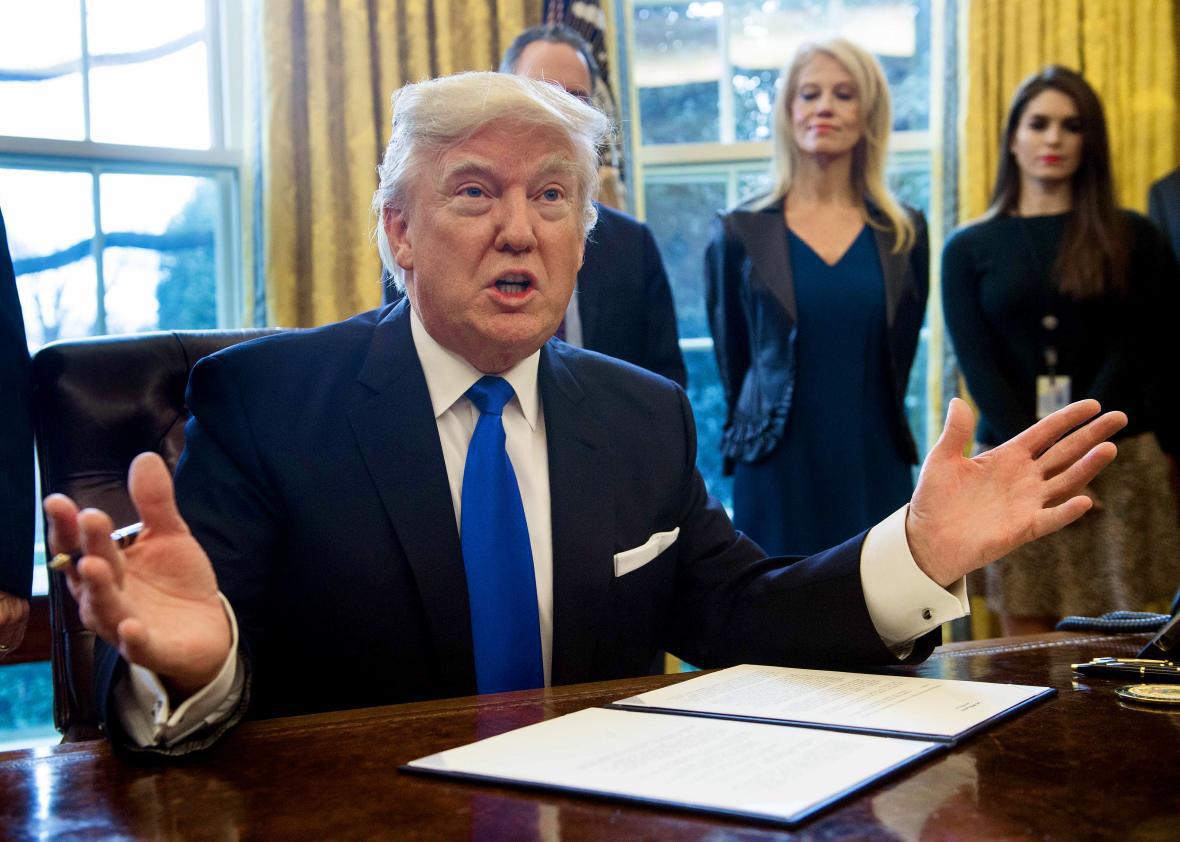President Donald Trump on Wednesday called for a “major investigation” into voter fraud. While his tweets announcing the call focus on the possibility of double voting and voter registration fraud, the main claim of fraud Trump has made over the past few months is that 3 million to 5 million illegal voters cast ballots in the election, which is his explanation for Hillary Clinton’s popular vote victory.
The claim that there were millions of illegal voters in this past election is false and unsupported by any credible evidence. The National Association of Secretaries of State, made up of the chief election officers of all 50 states, just issued a statement saying so. (Here is an explanation of Trump’s apparent justification for making the claim.) Trump’s own lawyers told a court in connection with Jill Stein’s request for a Michigan recount that “all available evidence suggests that the 2016 general election was not tainted by fraud or mistake.”
The administration has promised more details about the coming investigation later this week. Considering his continued advocacy for totally discredited voter fraud claims, there is no reason to believe that any investigation Trump orders would be fair and a search for the truth. Here, though, are some markers to determine whether it would be. Assuming Trump is not going to order a fair investigation, there should be a shadow investigation following these markers.
First, members of the commission should be bipartisan and well-respected on all sides. This was the model of the Carter-Ford commission that investigated problems with the 2000 election, the Carter-Baker Commission that investigated problems with the 2004 election, and the Presidential Commission on Election Administration that was led by leading Democratic lawyer Bob Bauer and leading Republican lawyer Ben Ginsberg and that investigated problems with long lines and election administration after the 2012 election.* Legal commentator Andrew Cohen has suggested a commission headed by retired Supreme Court Justices Sandra Day O’Connor, David Souter, and John Paul Stevens, with a staff led by former U.S. attorney Patrick Fitzgerald. (All are Republicans, though Souter and Stevens leaned pretty liberal when they were on the court.)
Second, the commission should have professional staff with experience dealing with election administration aimed at searching for the truth through an examination of credible evidence. The Bauer-Ginsberg commission’s research director was Nate Persily, a Stanford law and political science professor who is known for his careful and even-handed research. Back in 2000 there were few political scientists and law professors studying the details of election administration. Now there are many and a large set of peer-reviewed studies on these issues, including questions of voter fraud. There are plenty of ways to try to examine these issues, and the precise claim of President Trump that 3 million to 5 million votes could have been cast illegally in a massive conspiracy without detection should be probed in a fair and scientific way.
Third, the commission should include people who actually run elections. It is the people who understand the nuts and bolts of voter registration and voting processes who can best work with social scientists in explaining the safeguards in place to protect against illegal voting and point to where holes and flaws in the system might be. The earlier commissions all included election officials who understand these processes.
Fourth, the commission should be careful to examine each allegation separately and to issue conclusions on each allegation. Is there any evidence of millions (or even thousands or even hundreds) of noncitizens voting in American elections? Is there any evidence of millions (or even thousands or even hundreds) of people voting in the name of dead people or otherwise impersonating eligible voters? Is there any evidence of double voting, and if so is it on a scale to influence the outcome of a presidential election? Is there any evidence of voter registration fraud, and if so, is there any evidence that voter registration fraud leads to actual fraudulent voting on a scale to influence the outcome of a presidential election? Or are many of the errors in the voting rolls due to harmless bureaucratic issues, such as top presidential advisers being registered in multiple states?
Fifth, the commission should look not only at the potential for fraud, but also at the potential for purported anti-fraud measures to suppress legitimate voters. How much voter fraud would any proposed strict voter identification laws prevent? Would restrictions on early voting and same-day voter registration deter voting more than they deter fraud? Is it possible that these laws are passed in order to give a partisan advantage to one party or the other rather than to prevent voter fraud?
Finally, in light of whatever credible evidence of the potential for voter fraud and voter suppression is uncovered, what would this well-respected bipartisan panel, staffed with professionals and including actual election administrators, suggest be done to ensure that all eligible voters—but only eligible voters—can cast ballots that will be fairly and accurately counted?
Baseless allegations of voter fraud hurt our democracy. You would think after the Department of Justice under President George W. Bush spent five years investigating voter fraud with nothing to show for it, the voter fraud canard would have been put to bed years ago. This call for a major investigation, if done fairly, could finally put the issue to bed. Let’s not fool ourselves into believing President Trump would order a fair investigation. But if he doesn’t, we will need a shadow investigation to counter whatever a Trump commission might put out to support its boss’ baseless conclusions.
Correction, Jan. 26, 2017: This article originally misstated when the Presidential Commission on Election Administration was launched. It was after the 2012 election, not the 2008 election. (Return.)
